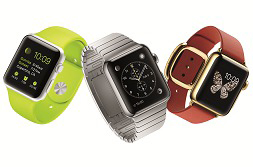Apple has launched its smartwatch alongside a new open source toolkit designed for medical and health research.
Apple Watch, which goes on sale on April 24, is the US company’s first smartwatch and is forecast to make a significant impact on the wearables market.
[Read more: Apple Watch to instigate “158% growth” in wearables market]
The wearable brings with it a selection of health-focussed apps that enable users to track their fitness activity via a heart rate sensor, accelerometer, Wi-Fi and GPS.
The Activity app, for example, provides a simplified overview of the wearer’s daily activity, including a function that alerts the user if theyhave been sedentary for too long.
Apple Watch is also compatible with Apple Pay, Apple’s HCE-based mobile payments system, and features a new haptic feedback system that allows users to send touch-based communications to other users.
The device is available in three models: Apple Watch, Apple Watch Sport and Apple Watch Edition, with prices ranging from $349 to $10,000 (approximately €325 to €9,000).
Beyond the personal fitness tracking, Apple also used its Spring keynote to introduce ResearchKit, a new open-source framework designed to grant medical workers deeper insight into patient health.
The app allows health professionals to access statistics such as weight, blood pressure and glucose levels from patients’ iPhones. It can also collect information on patients’ usage of healthcare equipment such as asthma inhalers, using data measured by third-party devices and applications.
Additionally, medical workers can request access to users’ accelerometer, microphone, gyroscope and GPS sensors to gather information on motor impairment, fitness, speech and memory, Apple said.
Apple said ResearchKit would allow doctors and scientist to gather more accurate data for large-scale health studies and provide more personalised treatment for illnesses.
Dr Patricia Ganz, Director of Cancer Prevention & Control Research at UCLA’s Jonsson Comprehensive Cancer Center, said: “We’re excited to use these new ResearchKit tools from Apple to expand participant recruitment and quickly gather even more data through the simple use of an iPhone app. The data it will provide takes us one step closer to developing more personalised care.”
“Access to more diverse patient-reported health data will help us learn more about long-term after-effects of cancer treatments and provide us with a better understanding of the breast cancer patient experience.”
ResearchKit is now available to download from the App Store in the US. Apple said it would be rolled out to more countries “in the future.”
Read more:



